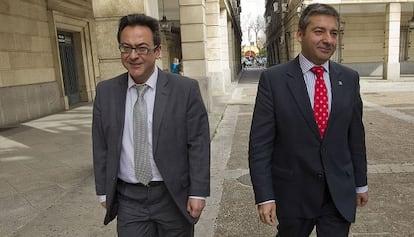Anticorruption attorneys want Supreme Court to handle part of ERE fund scandal
Judge Alaya asked to transfer section of her investigation into Andalusian embezzlement case

The Anticorruption Prosecutor’s Office has asked the judge investigating the Andalusian labor fund scandal to transfer part of the case to the Supreme Court.
The move would affect seven former Socialist officials under scrutiny for their alleged role in a long-running fraud case involving an Andalusian government fund used to help pay jobless benefits at struggling companies conducting labor adjustment plans (or EREs in Spanish). As much as €140 million may have been misused between 2001 and 2010.
The officials include two former Andalusian premiers, Manuel Chaves and José Antonio Griñán, as well as five ex-regional commissioners. All seven of them enjoy parliamentary immunity that exempts them from being tried in regular courts.
Anticorruption attorneys want to bring some order to a massive investigation that already involves over 20 suspects
Griñán stepped down from the premiership last summer, significantly ahead of the end of his term, in what critics viewed as an attempt to spare the Socialist Party the embarrassment of having to dismiss him if he ultimately became an official target of the investigation.
The anticorruption attorneys want to apply some order to a massive investigation that already involves more than 20 suspects. Besides asking examining Judge Mercedes Alaya to send the part of the case involving the figures with immunity from Seville to the Supreme Court, they are suggesting that the rest of the case be broken up into smaller, separate units. Each section would deal with different alleged crimes connected to the ERE case – for example, the people who collected benefits from companies they never worked for; the companies who received aid for non-existing restructuring; and the excessive fees charged by firms, mediators and even labor unions for services that were paid out by the regional government without even the most basic financial oversight.
In underscoring the sheer scope of the probe, the attorneys noted that 126 early retirement applications were processed, as well as 275 requests for corporate subsidies, during the decade that the €700-million public fund was in operation.
Tu suscripción se está usando en otro dispositivo
¿Quieres añadir otro usuario a tu suscripción?
Si continúas leyendo en este dispositivo, no se podrá leer en el otro.
FlechaTu suscripción se está usando en otro dispositivo y solo puedes acceder a EL PAÍS desde un dispositivo a la vez.
Si quieres compartir tu cuenta, cambia tu suscripción a la modalidad Premium, así podrás añadir otro usuario. Cada uno accederá con su propia cuenta de email, lo que os permitirá personalizar vuestra experiencia en EL PAÍS.
¿Tienes una suscripción de empresa? Accede aquí para contratar más cuentas.
En el caso de no saber quién está usando tu cuenta, te recomendamos cambiar tu contraseña aquí.
Si decides continuar compartiendo tu cuenta, este mensaje se mostrará en tu dispositivo y en el de la otra persona que está usando tu cuenta de forma indefinida, afectando a tu experiencia de lectura. Puedes consultar aquí los términos y condiciones de la suscripción digital.









































